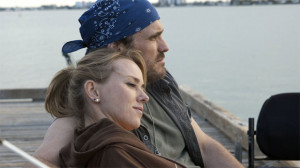Watching Laurie Collyer’s films, you can’t shake the feeling of impending disaster. It’s there in the characters she deploys: They’re down, one mistake away from being out. But its the films themselves, too — they always seem on the verge of taking their melodrama and gloom one step past what we can bear.
Take the opening scene of Sunlight Jr.: Melissa (Naomi Watts) wakes up on a rainy day in her less-than-glamorous room at the Floridian Inn. Her boyfriend, Richie (Matt Dillon), insists on driving her to work, only to have the car sputter to a stop when it runs out of gas.
The kicker comes when Melissa begins to walk the rest of the way: The wind dismantles her umbrella before she can take more than a few steps. Even when it comes to the small things, Collyer never lets her characters catch a break — a tendency that leaves her films at risk of wallowing in their own misery.
Sunlight Jr. follows on Collyer’s debut narrative feature, 2006’s Sherrybaby, and the two are of a piece. The earlier film’s protagonist is a heroin addict out on parole and trying to reconnect with her young daughter; in Sunlight, Melissa is a cashier at a gas-station convenience store, and she’s only narrowly avoiding a life like that of the alcoholics and vagrants who are fixtures in her life.
But the two films, far from feeling repetitive, deepen each other — and they emphasize Collyer’s ability to take her audience to the brink of despair before pulling it back. Presenting viewers with characters who are at once the victims and the causes of their beleaguered lives, Collyer has a rough, no-punches-pulled honesty, but also the empathy not to make them playthings in some sadistic social-realist experiment.

9(MDAzOTIwODA0MDEyNTA4MTM1OTcyMGJmMA001))

